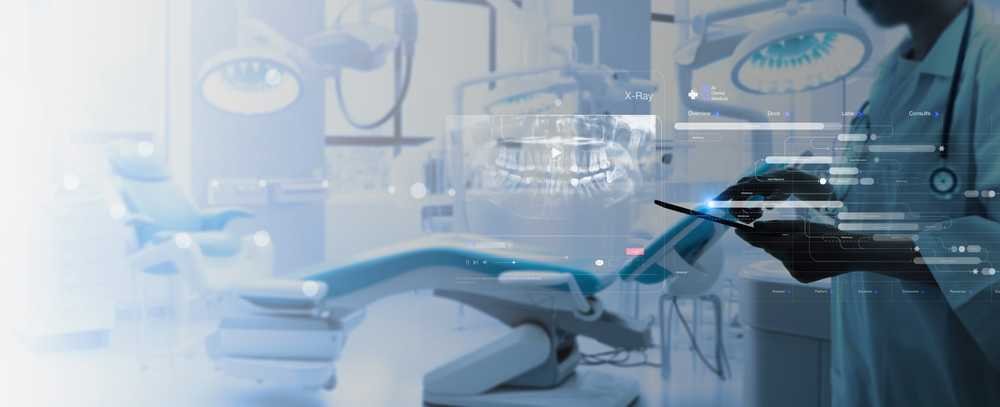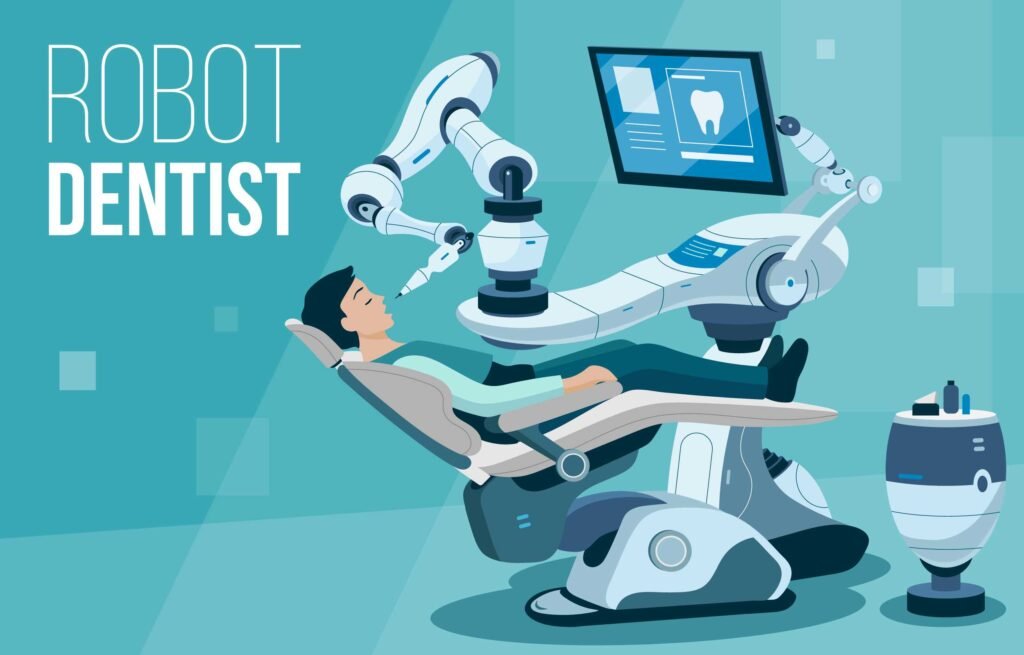You may feel like the fourth industrial revolution has snuck up on you. In particular, the contributions of artificial intelligence (AI) have made their way into virtually every aspect of our lives, including healthcare. Artificial intelligence in dentistry is no exception.
AI has revolutionized almost every aspect of oral healthcare, including diagnostics, treatment planning, surgery, patient education, and business administration. The increasing popularity of dental AI is evidenced by the more than 1,500 AI vendors currently serving the healthcare industry.
In addition to improving the quality of care, artificial intelligence in dentistry has transformed dental treatments and diagnostic processes. As you continue to discover the potential of dental AI—and a few of the challenges—it’s important to understand AI’s role in oral healthcare and its advantages. In this article, we explore the relevance of AI to dentistry and the specific applications of AI to dental care, particularly diagnostics. You’ll also learn how you can incorporate AI into your dental practice.
Understanding AI and its Relevance to Dentistry

Although artificial intelligence in dentistry is a relatively new phenomenon, AI is not in its infancy. Although AI dates back to the early 1950s, it didn’t manifest as a practical tool until the late 20th century with the proliferation of algorithms and large data sets.
AI represents a computer science sub-discipline focusing on building intelligent software and equipment. AI performs sequences of operations that mimic human activity, usually some aspect of problem-solving. In AI, executing each task involves acquiring new knowledge and fine-tuning by subject-matter experts. For example, dentists can use X-ray imaging that uses AI to detect cavities.
The AI learns to recognize patterns in the teeth, cataloging thousands of images ranging from healthy to unhealthy. As experts provide feedback to the system, the AI improves cavity detection over time, ultimately contributing to improved methods and tools.
Advantages of Artificial Intelligence in Dentistry
AI in dentistry can bring numerous benefits to dental providers and their patients. One significant advantage is how it enhances the quality of care and increases health outcomes. For instance, AI-powered tools and methods can help dentists identify risks in the early stages before they become significant and even life-altering problems.
One contributor to early detection is the precision that AI affords. With AI, primary care dentists and specialists can analyze X-rays and other images with cutting-edge accuracy to pinpoint conditions that would otherwise go undetected. AI’s heightened accuracy and detection capabilities can help reduce dental errors, such as performing unnecessary procedures or missing early signs of oral cancer.
Another significant advantage of artificial intelligence in dentistry is the ability to process and analyze extensive amounts of patient data to improve treatments and procedures, ultimately leading to better patient outcomes. Patient data can inform the improvement of diagnostic and treatment solutions and prevention strategies, decreasing risks, errors, and medical costs in the long run.
Enhancing the patient experience also involves promoting patient education and satisfaction. Most patients have difficulty interpreting most dental X-rays and images. AI-generated visuals can add more depth and context to an image, helping patients understand what they’re looking at. For example, a patient with periodontitis or tooth decay can see a visual representation of their condition’s progression if they opt out of treatment.
Artificial intelligence in dentistry is also critical in making dental care more streamlined and efficient, especially in offices affected by employee shortages. AI can take on time-consuming tasks, such as scheduling, data entry, insurance claim submissions, and receiving payments, leaving dental staff with more time with their patients. Also, patients can consult virtual assistants and chatbots after business hours to get answers to their urgent questions or concerns.
Finally, the above advantages contribute to potential administrative and medical cost savings associated with AI. In the healthcare industry, AI innovations in early detection and greater precision in treatments will lead to savings of $150 billion by 2026, reflected in such changes as fewer hospitalizations and the reduced need for advanced therapies.
How Does AI Improve Dental Diagnostics?

More accurate and efficient diagnoses represent some of the most acclaimed advantages of artificial intelligence in dentistry. Dental aid applications (i.e., apps) and AI software assist providers in spotting early signs of caries, gum disease, structural problems, and oral cancer. AI-powered imaging and extensive patient data give dental providers an edge in spotting problems early, helping them avoid the need for more advanced and invasive procedures.
Positive diagnoses also rely on accuracy in data and image interpretation, which AI can facilitate. The enhanced accuracy of artificial intelligence in dentistry has been instrumental in stopping the progression of many devastating dental conditions, such as periodontitis, tooth abscesses, oral cancer, and advanced tooth decay.
Beyond detection, dentists can use the precision of diagnostic AI to develop individualized treatment plans and recommendations based on real-time data and advanced imaging. Integrating AI into diagnostics allows providers to analyze test results more quickly and recommend courses of action even during diagnosis.
Furthermore, with more detailed imaging and visualization, AI can help patients better understand their diagnoses, boosting their engagement in the visit and trust in their providers. AI technologies can make it easier to involve patients in decisions regarding their treatment and maintaining their oral health.
How Is Artificial Intelligence in Dentistry Transforming Dental Practices?

Saying that AI has revolutionized dentistry is an understatement. With investors sinking about $31.5 billion into healthcare AI between 2019 and 2022, it’s easy to predict that this technology will continue to impact virtually all aspects of oral healthcare. Here are some of the most prevalent advancements already attributed to artificial intelligence in dentistry:
- Automated diagnosis: Detecting dental problems through the scanning and analysis of X-rays and other dental imaging
- Disease prediction and risk assessment: Assessing with greater precision potential problems and outcomes of various treatments and predicting patients’ risks for developing periodontal and other diseases
- Imaging: Generating three-dimensional (3D) models of teeth and other oral areas that allow dentists more detailed views to guide treatment or surgeries
- Orthodontics: Planning treatments, predicting outcomes, and producing “before” and “after” visuals to encourage adherence to treatment
- Patient tracking and personalized treatment: Tracking patients’ treatment progress by using software and apps to collect real-time data and analyze dental records, enabling rapid adjustments to treatment protocols
- Robotic surgery: Increasing accuracy and reliability in robotic surgeries involving implant replacements and other procedures
- Treatment planning: Using algorithms and 3D modeling and imaging to recommend the most appropriate and personalized treatment plans based on teeth structure, dental issues, patient data, and other factors
- Virtual and augmented reality: Enhancing patient education and presenting visual representations of treatment options and outcomes
- Administrative support: Addressing staff shortages and saving time by using chatbots and virtual dental assistants to streamline appointment scheduling, reminder notifications, billing, and patient communication
In addition to the AI applications that benefit patient care, artificial intelligence in dentistry holds promise for preparing future practitioners and contributing to more significant advancements in the field. For instance, AI is changing the face of dental education at all levels. Advanced 3D imaging and virtual reality help students improve their diagnostic and treatment skills, engage in surgical and treatment planning simulations, contribute to dental research, and receive feedback.
AI has also already revolutionized how dental researchers expand on industry knowledge and improve diagnostic and treatment methods. Researchers can use AI algorithms to analyze large patient data sets and apply their findings to identify new oral health conditions and improve dental care.
AI further contributes to collecting large data sets that help researchers become more adept at spotting trends and assisting practitioners to make better decisions. The continued expansion of stored patient data can contribute to more predictive dental care.
For instance, predictive AI models based on massive data can enable dentists to predict a patient’s risk for advanced periodontal disease or oral cancer. This knowledge can help dentists and patients collaborate more proactively to develop a treatment plan and prevent or slow disease progression.
Considering the transformative impact of artificial intelligence in dentistry, this technological realm is still in the early developmental stages. This means that innovations can come with challenges that practitioners, researchers, and patients should recognize and anticipate:
- Data accuracy and security: Sensitive patient data is always vulnerable to cyber attacks and breaches. When using and sharing protected health information, dental practices and organizations can address this risk with robust cybersecurity measures and anti-virus software.
- Potential for limited patient communication and de-personalized care: The expansion of chatbots and virtual assistants makes reduced face-to-face interactions possible. However, dentists and dental students can receive training in empathy, communication, and personalized care to compensate for the lack of human interaction outside dental visits.
- Threats to patient safety: When aware of the use of AI in dental treatment, some patients may harbor fears of robots making diagnostic mistakes or causing physical harm. Remember that AI is a tool, not an autonomous agent acting alone. Providers should apply AI software while still engaging in human, patient-centered approaches.
- Problems with interoperability and integration: Will a newly adopted dental app work with your office’s computer or electronic medical record system? The key to addressing this risk is ensuring the prospective technology uses data formats and interfaces that work with current systems and workflows.
For all its potential, artificial intelligence in dentistry is far from an exact science. The key to leveraging AI’s advantages and minimizing risks lies in upholding human judgment and expertise in dental care. Using AI to alter treatment plans or interpret diagnostic images should always include a human element.
Adherence to dental and healthcare regulations can help you avoid mishaps like violating patient privacy, making medical errors, or compromising safety. Complying with the highest standards can ensure ethical, responsible, and productive implementation of AI technologies, allowing for continued advancement in care.
How Can I Implement AI in My Dental Practice?

As with any new or emergent technology, AI does not warrant adoption for its own sake. While multiple technological options are available, knowing which ones your practice should incorporate can be challenging. However, before addressing this issue, you may need to alleviate any hesitancies or uncertainties your colleagues and employees may have about integrating AI into their work processes.
Perhaps the best way to tackle this hurdle is to remind them how they already use AI in their personal lives. Do any of them use Google Maps when they travel, or do they subscribe to movie streaming services like Netflix? Do they use voice activation to select music or adjust the home thermostat? It’s easy to forget that the devices we depend on collect our data and use algorithms to give us results tailored to our preferences.
Pointing out how pervasive AI already is in our lives can help them warm up to its use in the dental office. They may soon realize how much AI can enhance their jobs, not replace them.
Once you’ve garnered enough buy-in from your personnel, find out which processes consume too much time or interfere with patient care. Ask them what they wish they could automate or what tasks their current schedule doesn’t allow them to do. Their responses can shed light on the applications that can make the most significant impact.
You can also hire an AI vendor to get recommendations on using AI to improve your practices. A qualified vendor will ask you what you want to accomplish, your current needs, and your pain points. They can use your input to recommend the best tools and solutions tailored to your practice. See if the prospective vendor might offer a free initial consultation, and prepare for the first meeting by bringing a list of questions.
Conclusion
Artificial intelligence has been a boon to the dental field by increasing diagnostic accuracy, decreasing medical costs, and optimizing treatment outcomes. Despite the marvels AI has already demonstrated, it’s far from perfect and incapable of completely replacing human healthcare providers. A productive approach to AI is to view it as a complement to sound and informed dental practice.
When you understand the relevance of AI in dentistry and appreciate its applications and impacts on dental care, it’s easier to find ways to incorporate it into your practice. As you and your patients increasingly embrace and utilize artificial intelligence in dentistry, you’ll recognize that AI can benefit your expertise and skills, your business’s stability, and your patient’s dental and overall well-being.

Comments are closed.